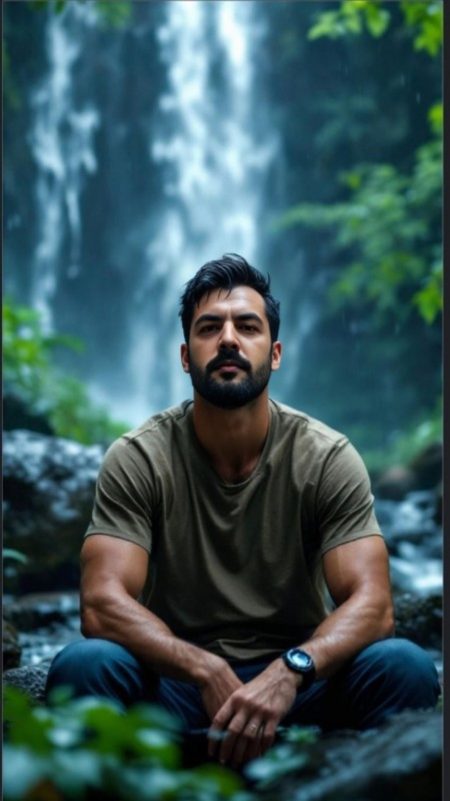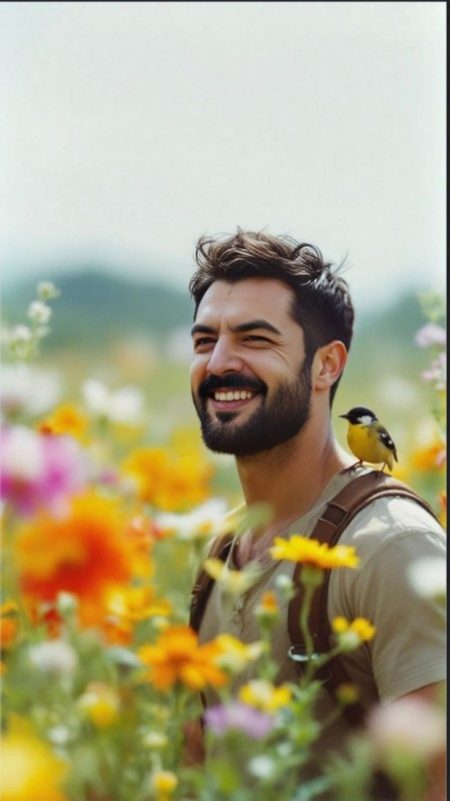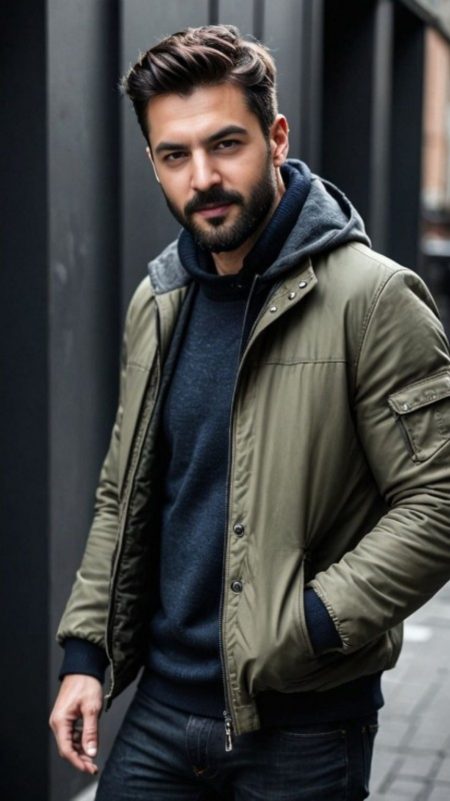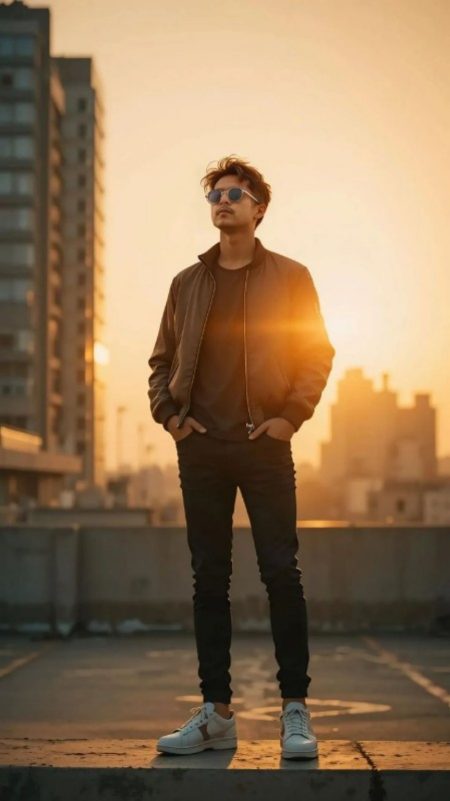mens asthetic photoshoot gemini prompt




Every image tells a story, and when it comes to capturing men’s aesthetic photography the right prompt can turn a simple picture into something cinematic and unforgettable. With tools like Gemini AI making it easier than ever to generate studio-quality visuals, understanding what makes an aesthetic photoshoot stand out is essential. Knowing the elements of pose, lighting, outfit, background, and vibe will help you craft a prompt that yields images which feel professional, authentic, and full of character.
Imagine you want that rich, editorial portrait with dramatic lighting. You might start your prompt with “a strong cinematic studio portrait of a man,” then layer in details like “soft rim lighting,” “deep shadow contrast,” “hands relaxed at sides,” “tailored jacket over a turtleneck,” “dark backdrop with subtle texture.” These details build up the visual architecture that helps Gemini AI generate something truly powerful.
One of the most effective ways to create a men’s aesthetic look is to lean into style contrast. Mixing rugged and refined elements—such as pairing a sleek leather jacket with distressed jeans, combining soft natural light with harsh architecture, or using accessories like a watch, hat, or minimal jewelry—can elevate the image. When you tell Gemini something like “add subtle texture to shirt fabric,” or “leather sheen on jacket collar,” you guide the AI to capture refined details that make high-end editorial photography so appealing.
Lighting plays a pivotal role in aesthetic photography. Golden hour, soft overcast skies, directional natural light—each has its own mood. A prompt could include “warm golden hour glow on side of face,” “soft lens flare,” or “diffused window light from side window,” depending on whether you want a heroic, dreamy, or moody look. Including the precise lighting scenario helps Gemini understand what kind of shadows, color temperature, and highlights to build into the image.
Posing might seem secondary, but it’s how you communicate mood. A relaxed pose with slight turn of the torso, or looking off-camera, or sitting casually, lean against something—these subtle choices change the personality of the final image. A prompt might say “eyes half closed, slight tilt of head, one hand in pocket,” or “leaning against rail, one foot forward, gaze toward horizon.” This gives organic, effortless style, rather than stiff or overly posed shots.
Outfits and styling are equally important. Mention whether the look is casual streetwear, smart casual, editorial formal, or vintage inspired. Details like “white sneakers,” “rolled sleeves,” “vintage watch,” “leather belts,” or “textured fabrics” help the AI visualize fabric movement, texture, and reflectivity. Including color tones—earth tones, black & white, muted pastels—guides mood and cohesion in the final photo.
Background and setting give context and ambiance. A city street at night with neon signs, a vintage car parked under golden sunset, a lush forest, or a concrete rooftop all convey different themes. When you specify “background blurred city lights,” “neon reflections on wet pavement,” “forest foliage softly framing subject,” or “rooftop skyline at dusk,” you let the AI craft a setting that supports your aesthetic mood instead of generic backdrops.
To make prompts even more powerful, including technical specifications helps. Words like “4K detail,” “cinematic depth of field,” “soft bokeh,” “high dynamic range,” “studio grade lens,” tell Gemini to pay attention to image quality. If you want an editorial vibe, mention “sharp focus on eyes,” “skin texture visible,” “hair individual strands visible,” or “fabric detail.” That level of detail separates a pro-looking render from a generic result.
Another strategy is variation: create prompt templates with a few changeable variables. For example, a template might read: “Full-body portrait of a man wearing [casual/ formal/ vintage] outfit, in [city / forest / rooftop] setting, during [golden hour / moody shade / neon night], with one hand in pocket and gaze off-camera.” Swapping the options gives you many uniquely styled images, all aligned with your desired aesthetic brand.
Also important: the face or subject identity often stays constant in many of these AI prompts. When you include “preserve facial features exactly,” or “don’t alter face, keep same reference photo,” you ensure consistency across a portfolio. This consistency builds trust and recognizability if you’re using the images for personal branding, social media, or marketing.
One common theme in recent Gemini-AI men’s aesthetic prompts is blending retro vibes with modern touches. Think vintage jackets, retro collars, 70s or 90s textures, muted or warm color palettes, film grain effects, and props like aviator sunglasses or classic automobiles. These give an honoring nod to past styles while keeping visuals fresh with crisp lighting, modern framing, and digital polish.
Making the visuals feel alive often means adding subtle atmospheric or environmental touches. A little mist, rain, lens flare, subtle shadow play, soft glow through foliage, or dust motes in light beams can enhance drama. If your prompt includes “light mist behind,” “slight reflection in water,” “rain droplets on jacket,” “flare through trees,” you add organic texture that catches the eye.
In terms of color grading, the choice of tone can define the style. Warm sepia tones carry nostalgic warmth; teal and orange palettes give cinematic contrast; monochrome or near-black-and-white adds drama and timelessness. You can prompt “warm tone with muted highlights,” “teal shadows and orange highlights,” or “desaturated midtones with strong highlights” depending on mood.
To ensure the generated image works well for your uses—whether prints, social media posts, or website features—consider framing and aspect ratio. Vertical or portrait orientation (e.g. 3:4, 9:16) is great for mobile and stories; square can be for Instagram feed; wide format for banners. If your prompt says “portrait orientation, shallow depth of field, subject centered,” you get compositions that work well in those spaces.
For those just starting, here are a few sample prompts inspired by men’s aesthetic shoot trends: “Hyper-realistic portrait of a man in vintage leather jacket leaning on a motorcycle at golden hour, preserving facial features exactly, studio-grade lens, warm cinematic color grading.” Or “Moody black-and-white headshot under dramatic soft side light, textured turtleneck sweater, subtle film grain, intense gaze into camera.” Tweaking minor details in these gives vastly different moods.
Finally, after running your prompt with Gemini AI, iteration is key. Sometimes the first version might not have exactly the shadow intensity, clothing texture, or background pop you want. Slight adjustments—modify lighting, tweak color tone, refine pose—can move the result from good to striking. Save the versions you like, compare, learn which phrasing works best.
So whether you're aiming for editorial, streetwear, vintage, or cinematic looks, combining detailed prompts with your creative vision, understanding lighting, styling, posing, and background will elevate your photoshoot output dramatically. Let your prompts be as intentional as your final images—describe not just what you want to see, but how you want it to feel.
